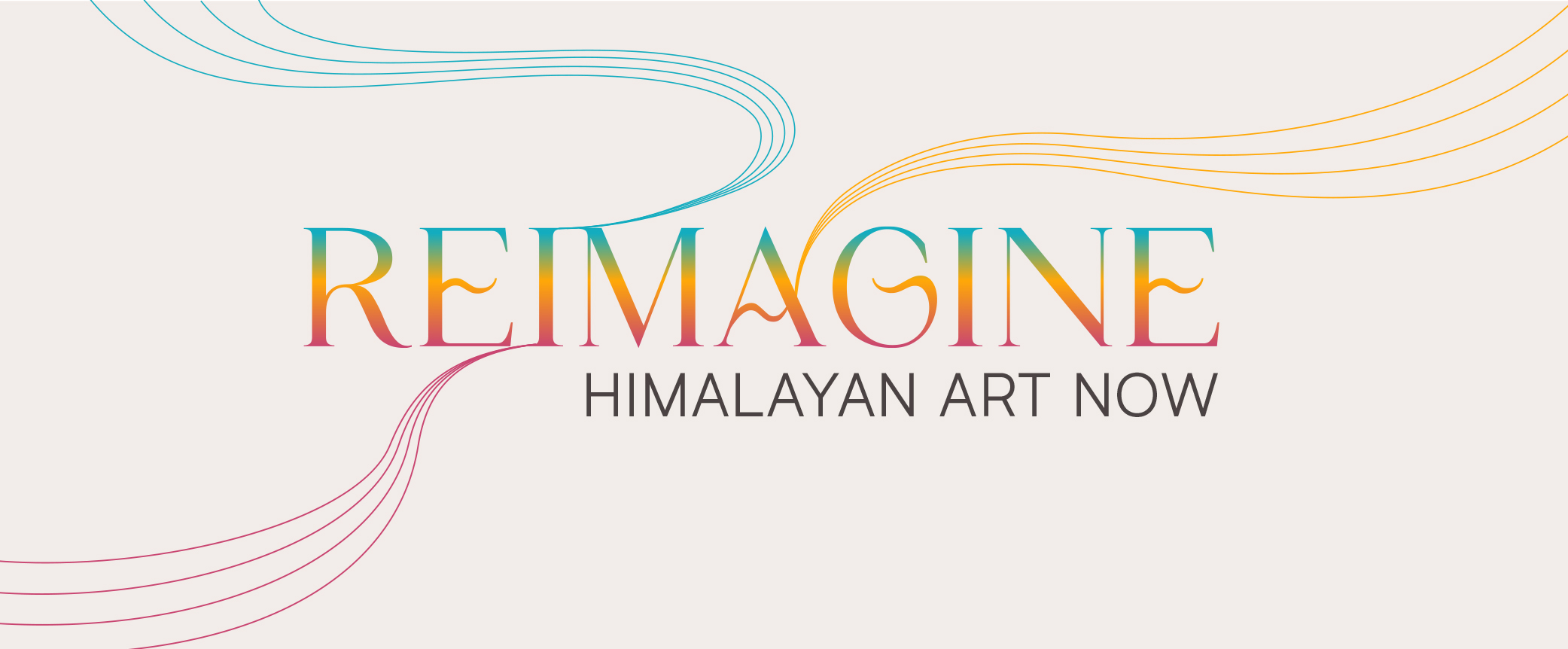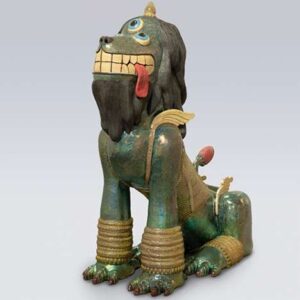
Tenzin Gyurmey Dorjee
Reimagine: Himalayan Art Now
March 15–October 6, 2024
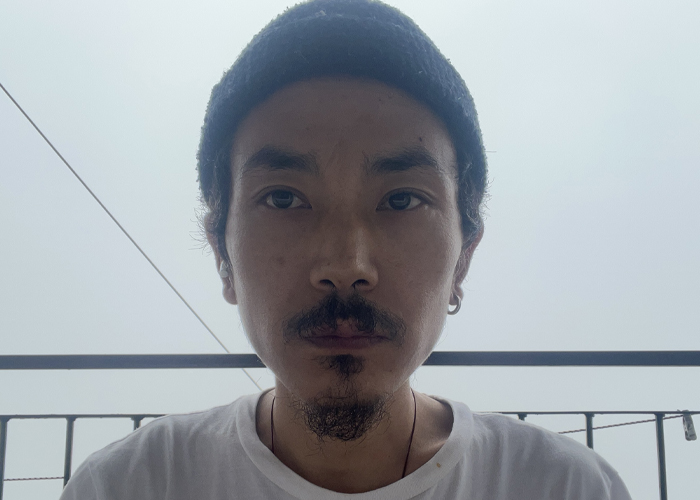
LISTEN TO THE ARTIST
ABOUT THE ARTIST
Tenzin Gyurmey Dorjee (he/him)
b. 1987, Himachal Pradesh, India; lives and works in Himachal Pradesh, India
As a second-generation Tibetan refugee based in India, Tenzin Gyurmey Dorjee celebrates the history and culture of the Tibetan diaspora through his intimate portrayals of family and friends. He examines the way that he and those around him have adjusted to displacement from their native home and resettlement in a new society, a place steeped in modern Western and Indian influences. The artist uses different mediums to gain insights into ordinary, often seemingly mundane objects. He draws inspiration from pop culture and high art by allowing their expressions into the art to bring attention to his personal stories.
Tenzin Gyurmey Dorjee was born in 1987 in Kamrao village in India, and was introduced to traditional Tibetan-style thangka painting at the age of six by his father. He went to College of Arts, Delhi to study the arts, which he has been pursuing professionally since 2013. His studio is currently based in Dharamshala, India.
tenzingyurmeydorjee.com / @Pee_in_the_bottle
ABOUT THE ARTWORK IN REIMAGINE
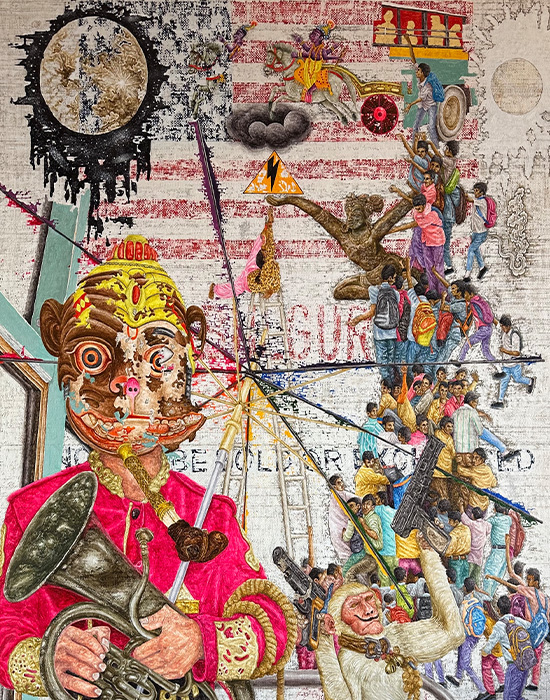
Inspired by his days taking the local bus, Tenzin Gyurmey Dorjee illustrates a world informed by different perspectives representing where he belongs and how he perceives his surroundings in his community of displaced people. The lively scene comprises groups of people he might see on the bus in India—a traveling wedding band and nervous students, excited lovers and hapless beggars, all in one place on top of a vehicle. He aims to bring humor and oneness to these images of separation and loneliness.
The artist chose three objects from the Rubin Museum’s collection to reimagine within this humorous bus scene: a thighbone trumpet from Tibet, used as a ritual implement in the practice of “cutting the ego”; a monkey mask from Bhutan, which speaks to Hanuman’s loyalty to Ram and represents Tenzin Gyurmey Dorjee’s loyalty to the people of India who welcomed Tibetans; and a wooden apsara figure that was repatriated to Nepal in 2022. Speaking of this choice, the artist said, “I saw it in the newspaper [the return of the apsara] and thought it was very brave of the Rubin Museum to give it back to Nepal, so you can see that in my work as well, [the] returning back to Nepal.”
RELATED RUBIN OBJECT
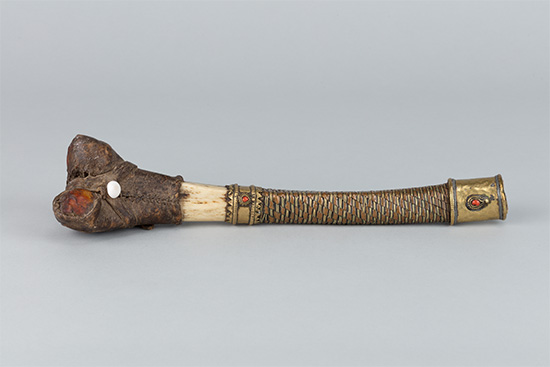
This object from the Rubin Museum’s collection is presented in the Reimagine exhibition in dialogue with chants of a monkey mind, inviting new ways of encountering traditional Himalayan art.
ABOUT THE ARTWORK IN REIMAGINE
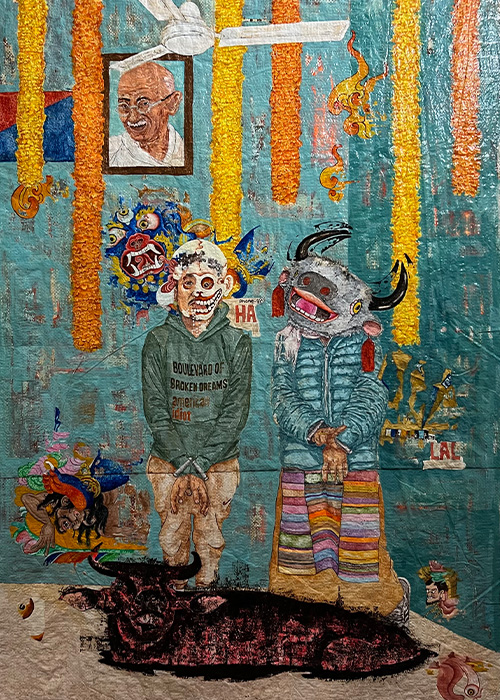
A Crime with Mother reflects Tenzin Gyurmey Dorjee’s inner conflict about purchasing forbidden buffalo meat with his mother. Many Buddhists regard meat-eating as sacrilegious, impure, and cruel, making no hierarchical distinction between animals and humans. The figures in the painting seem to wrestle with the heavy weight of transgressing this religious belief and the worldly fear of being arrested for obtaining meat from the sacred cow, which is illegal. The expression “sacred cow” is a reference to beliefs, customs, or conventions considered above criticism due to social or religious pressures of a society. The artist cleverly plays with this expression, challenging the stories, influence, and power of the “sacred cows” in his own culture and community.
Prominently displayed in the scene is a portrait of Mahatma Gandhi, the Indian leader and a symbol of religious piety as an avid vegetarian and advocate of ahimsa (nonviolence). The young Tenzin Gyurmey Dorjee has handcuffed wrists and a half-skull face, while his mother wears a severed buffalo head symbolizing their guilty conscience.

